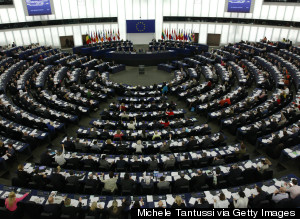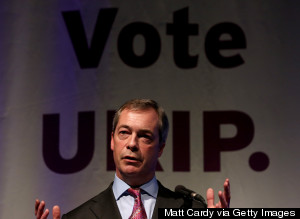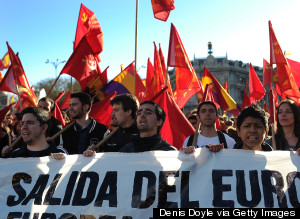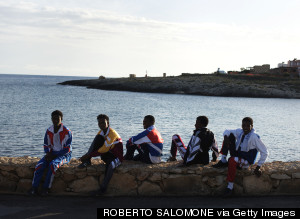
Starting today, voters all over Europe are heading to the polls to elect a new European parliament. With 751 open spots,candidates from 28 countries and the largest electorate in the world apart from India, the vote is impressive on paper. Yet don’t expect heated campaign debates or long lines at polling booths -- the European Union is remarkably unpopular.
While the European parliament holds the power to pass laws that apply to all of the EU's member states, voter turnout is expected to be even lower than during the 2009 election -- when a mere 43 percent of Europeans cast their votes. Eurosceptic parties like Ukip in the UK and the Front National in France are predicted to do well.
Between the Eurozone’s economic woes, a looming asylum and immigration crisis, the challenges of climate change and shifting global powers, the vote comes at a crucial time. To provide a better sense of what’s at stake, we asked the editors of The Huffington Post’s five European editions to describe the view of the election from their countries.
Europe has evidently grown tired of Europe. A recent poll by Pew Research found that only 45 percent of all Europeans actually like the EU. In Germany the levels of dislike for Europe aren’t quite as high, but the number of Germans who like the EU has nevertheless dropped 8 percent since 2012.
In many European countries, politicians have always found the EU a convenient scapegoat for their woes. For every comedian in Europe or media outlet, taking a few cheap shots at the myriad of European regulations always gets laughs or boosts the ratings. For example, “RL 2002/44/EG” is an EU rule that puts limits on how much electric drills or other devices are allowed to vibrate. You don’t even need to have a good sense of humor to get laughs by explaining that.
In addition, Germans have lost some of their affection for Europe because Germany feels like an island of bliss that is less dependent on Europe and somehow fortunate on its own, with a booming economy and low unemployment levels. Germans know that all over Europe the last years have been tough and economies have suffered. But our industrial system worked, our political system worked, our life is good, and we have Angela Merkel. So why should we care about all those spendthrift, undisciplined countries struggling to stay afloat around us? It is maybe a tad exaggerated, but sadly too many Germans think like that.

And what's even more sad is that too many Germans seem to forget that all of our laws and regulations that are made by German politicians have to comply with European laws and regulations. And those are made in Brussels.
Or to put it in another way: The music we dance to is created in Brussels, so why let other people decide about who is going to be the DJ?
The fact of the matter is: It has probably never been more important to show up on voting day for the European parliamentary elections. A high turnout is what will be needed to keep Europe on track. In many of Europe’s 28 countries -- small and not so small -- right-wing populist parties are gaining traction. With the profound and lingering effects of the Eurozone crisis still wreaking havoc all over the continent, these right-wing populist parties see a kind of history opportunity to capitalize on people’s fears of the current situation. In times like this, a stronger, unified Europe is needed, now more than ever!
One political party dominates the press in the UK at the moment, and it's a party that doesn't have a single member currently sitting in the House of Commons. In fact, it's never had a member elected to parliament.
Labeled by the prime minister as a group of “fruitcakes and loonies and closet racists” some years back, Ukip may have succeeded where so many others have failed before: turning the British electorate on to the European elections.
I say "may." It has certainly made sure everyone knows that the elections are taking place on May 22nd, although even smothered across our front pages, that’s no guarantee of mobilizing a vote. Recent history certainly suggests it won’t: Only 34 percent of those eligible to vote in 2009 bothered to do so.

And the press obsession with Ukip is about Ukip, not the European elections themselves or the European parliament. Witness, for example, the fact that last week’s live TV debate between the candidates for the next president of the European Commission barely caused a ripple in the UK.
Currently holding nine of the UK’s 73 seats in the European parliament, Ukip is certainly the most vocal of our MEPs, albeit to decry the very institution that employs its members.
Geoffroy Clavel - Political Editor, Le Huffington Post
We often observe a painful paradox in France when it comes to Europe. The more the European parliament has power, the less it finds support within the population. The upcoming European elections will, without doubt, confirm this idea: A recent poll predicted that up to 62 percent of the French population won’t vote.
This voting crisis doesn’t only concern France or these particular elections. Other votes and countries are facing it, too. Yet there is no better time to observe it than when Europe can finally be blamed for all the wrongs occurring in Western countries.
We must concede that, over the past five years, the European Union hasn’t done much to help its most fervent supporters contradict these reproaches. Yes, it managed to save the euro, but at the cost of austerity measures despised by populations. And the EU clearly failed on the employment crisis.
Thinking of enlargement before integration, it distanced itself from people that were expecting more from Europe. They expected the Union to make up for their countries’ shortfalls, not to replace their nations or reproduce their mistakes -- this time at a European level.
France’s lack of love for the European Union is also, it is true, a national issue. Sixty-three percent of French people don’t trust the EU, the European Commission’s last Eurobarometer reported. Eighty-eight percent of them don’t trust their own politicians.
Maurice Schumann’s homeland hasn’t stopped playing the euroscepticism card over the past 15 years. There are the tired politicians unable to think better about Europe, the disillusioned media lacking the motivation to explain the continent’s real issues, and a complex, eight-region voting system preventing any national or European debate -- all of which seem to contribute to the victory of anti-European parties.
The European Union itself needs to change its system if it wants to prevent this democratic stagnation and prove its utility. Is it capable of doing so? “People only accept change in necessity, and only see necessity in crisis,” Jean Monnet once wrote. European parliament members’ desire to appoint an elected candidate as president of the European Commission is one timid, yet real sign of a possible democratic burst.
Spain is slowly emerging from the economic storm generated by the crisis, but Spaniards are still living under a strict austerity regime imposed by the EU. Thus, it's no surprise to see a decline in the excitement with which the country embraced the ideal of a united Europe. According to a survey by Pew Research, 80 percent of Spaniards shared a positive view of the EU in 2007, compared to only 46 percent in 2013. EU officials in Spain are keeping their fingers crossed, hoping that participation in the upcoming elections won’t be lower than a humiliating 40 percent.

While pro-European fervor has certainly waned, Spain is still different from other member countries. There are no openly-populist, eurosceptic, or even europhobic candidates in the election. Polls forecast a growth in voter preference for small and medium-sized groups, to the detriment of the two major parties, the ruling conservative PP and socialist PSOE. But, barring something unexpected, those parties will still add up to 65 percent of the electorate, so there will be only minor changes to the status quo. Spaniards can be angry at their political class, but they are not indicating a desire for adventures of uncertain fate when it comes to European issues.
The European elections are not dear to Italian hearts. According to a poll released by the Italian Institute on Public Opinion, almost a third of Italians (28 percent) “have no knowledge” of the upcoming elections and they’re not interested in learning more. Several polls indicate that abstentionism will be the true winner at the ballot box, as 40 percent of the electorate either hasn’t yet made up its mind or has decided it will not vote.

In Italy, eurosceptic parties are gaining a larger following: the populist Movimento Cinque Stelle (Five Star Movement) and the right-wing parties Lega Nord (North League) and Fratelli d’Italia (Brothers of Italy) together make up 35 percent of the electorate. Many perceive the EU as an abstract entity that has the sole function of imposing the decrees of austerity. Recent news from the EU parliament concerning excessive spending -- such as the 11,883,000 euros ($16 million) spent for limo rentals in 2012 alone -- has increased the frustration of voters who have already been amply tested by financial mismanagement and graft here at home.
Despite all of this, these elections are extremely important for Italy. The EU presidency will be under Italian control during the upcoming semester, and this could be an occasion to promote friendlier policies in Brussels for Mediterranean countries. Italy needs more support from the EU to manage the ongoing crisis of immigrants who die at sea while trying to reach the European “dream.” When it comes to the economy, it would be in Italy’s interest to abandon the austerity policies championed by Germany in favor of a new course focused on growth.
There is also the issue of European funds for development, a cause that Prime Minister Matteo Renzi has promised to fight for: “The amount of money Italy received from the EU is simply embarrassing. It’s less than what we contribute to Europe, it’s our money,” he said. “The EU is an extraordinary opportunity for every one of us.”